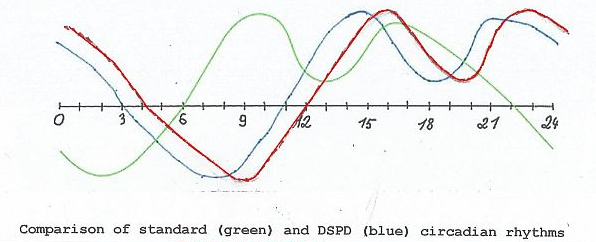

The following are B's words. We have not verified the information, and do not judge their applicability to others. What works for some may not work for others.
As I have gotten older (I passed 80 last March) my DSPD, as mild as it is, has become more and more difficult to manage.
My management techniques since was I was 40 were, in addition to sheer will power forcing my system into the "normal" daily awake/sleep cycle:
Before Ambien - Age 40 to around 50
After Ambien - After age 50, Ambien (Zolpidem) was introduced in the market as a sleep aid and for me it was a miracle drug.
Now I'm experiencing another symptom that I have never had to deal with. Starting around 4 PM I start to feel generally poorly. It's not nausea, but centers around an upset stomach, affects my appetite and often begins to make me feel depressed (cause & effect?). Then at about 8 PM it starts to subside and by 9 PM I feel great, probably better than any other time during the day. Unfortunately I don't get to enjoy it for very long, since I feel it's important to try to maintain a more common sleep/awake schedule, so I begin the nightly struggle, around 11 PM, to get to sleep. Incidentally that struggle has become more difficult with the 4PM - 8PM feeling bad and then the 8 till whenever feeling good.
Below is a graph of circadian rhythms that illustrate what the medical profession believes to be a good approximation of the awake/asleep cycles. As noted, normal is in green and the average DSPD in blue. Based on my some 70 years experience dealing with the effects and management of DSPD (I recognized I had a "go to sleep" problems since I was 8 years old) I've added what I think best represents my particular cycle, in red. The delay is about 1 hour greater although, as I have mentioned, its effect is somewhat mild as compared to others that I have read about.
